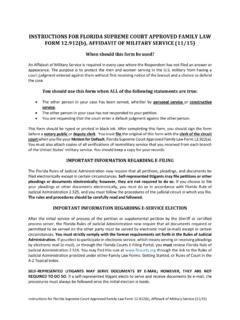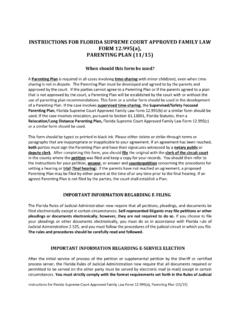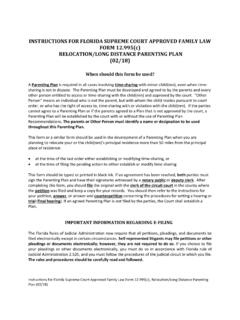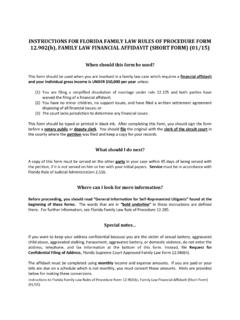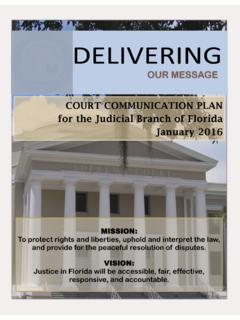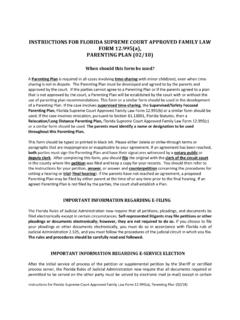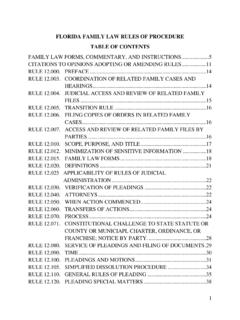Transcription of Florida Supreme Court Approved Family Law Form …
1 INSTRUCTIONS FOR Florida Supreme Court Approved Family LAW. form (c), SUPPLEMENTAL PETITION FOR MODIFICATION OF ALIMONY. (11/15). When should this form be used? This form should be used when you are asking the Court to change a current Court -ordered alimony obligation. The Court can change an order for temporary, permanent periodic, durational, and rehabilitative alimony if the judge finds that there has been a substantial change in the circumstances of the parties. Lump sum and bridge-the-gap alimony cannot be modified. This form should be typed or printed in black ink. After completing this form , you should sign the form before a notary public or deputy clerk.
2 You should file this form in the county where the original order was entered. If the order was entered in another state, or if the respondent lives in another state, you should speak with an attorney about where to file this form . You should file the original with the clerk of the circuit Court and keep a copy for your records. Because you are filing the petition in this proceeding, you are also referred to as the petitioner and your spouse as the respondent. IMPORTANT INFORMATION REGARDING E-FILING. The Florida Rules of Judicial Administration now require that all petitions, pleadings, and documents be filed electronically except in certain circumstances. Self-represented litigants may file petitions or other pleadings or documents electronically; however, they are not required to do so.
3 If you choose to file your pleadings or other documents electronically, you must do so in accordance with Florida Rule of Judicial Administration , and you must follow the procedures of the judicial circuit in which you file. The rules and procedures should be carefully read and followed. What should I do next? For your case to proceed, you must properly notify the other party in your case of the supplemental petition. Because this petition concerns alimony, you should use personal service. If the other party is in the military service of the United States, additional steps for service may be required. See, for example, Memorandum for Certificate of Military Service, Florida Supreme Court Approved Family Law form (a) and Affidavit of Military Service, Florida Supreme Court Approved Family Law form (b).
4 In sum, the law regarding constructive service and service on an individual in the military service is very complex and you may wish to consult an attorney regarding this issue. If personal service is used, the other party has 20 days to answer after being served with your supplemental petition. Your case will then generally proceed in one of the following three ways: If after 20 days, no answer has been filed, you may file a Motion for Default, Florida Supreme Court Approved Family Law form (a), with the clerk of Court . Then, if you have filed all of the required papers, you may call the clerk, Family law intake staff, or judicial assistant to set a final Instructions for Florida Supreme Court Approved Family Law form (c), Supplemental Petition for Modification of Alimony (11/15).
5 Hearing. You must notify the other party of the hearing by using a Notice of Hearing (General), Florida Supreme Court Approved Family Law form , or other appropriate notice of hearing form . If the respondent files an answer that agrees with everything in your supplemental petition or an answer and waiver, and you have complied with mandatory disclosure and filed all of the required papers, you may call the clerk, Family law intake staff, or judicial assistant to set a final hearing. You must notify the other party of the hearing by using a Notice of Hearing (General), Florida Supreme Court Approved Family Law form , or other appropriate notice of hearing form .
6 If the respondent files an answer or an answer and counterpetition, which disagrees with or denies anything in your supplemental petition, and you are unable to settle the disputed issues, you should file a Notice for Trial, Florida Supreme Court Approved Family Law form , after you have complied with mandatory disclosure and filed all of the required papers. Some circuits may require the completion of mediation before a final hearing may be set. Then you should contact the clerk, Family law intake staff, or judicial assistant for instructions on how to set your case for trial (final hearing). If the respondent files an answer and counterpetition, you should answer the counterpetition within 20.
7 Days using an Answer to Counterpetition, Florida Supreme Court Approved Family Law form (d). Where can I look for more information? Before proceeding, you should read General Information for Self-Represented Litigants found at the beginning of these forms. The words that are in bold underline in these instructions are defined there. For further information, see chapter 61, Florida Statutes. IMPORTANT INFORMATION REGARDING E-SERVICE ELECTION. After the initial service of process of the petition or supplemental petition by the Sheriff or certified process server, the Florida Rules of Judicial Administration now require that all documents required or permitted to be served on the other party must be served by electronic mail (e-mail) except in certain circumstances.
8 You must strictly comply with the format requirements set forth in the Rules of Judicial Administration. If you elect to participate in electronic service, which means serving or receiving pleadings by electronic mail (e-mail), or through the Florida Courts E-Filing Portal, you must review Florida Rule of Judicial Administration You may find this rule at through the link to the Rules of Judicial Administration provided under either Family Law Forms: Getting Started, or Rules of Court in the A-Z Topical Index. SELF-REPRESENTED LITIGANTS MAY SERVE DOCUMENTS BY E-MAIL; HOWEVER, THEY ARE NOT. REQUIRED TO DO SO. If a self-represented litigant elects to serve and receive documents by e-mail, the procedures must always be followed once the initial election is made.
9 To serve and receive documents by e-mail, you must designate your e-mail addresses by using the Designation of Current Mailing and E-mail Address, Florida Supreme Court Approved Family Law form , and you must provide your e-mail address on each form on which your signature appears. Please CAREFULLY read the rules and instructions for: Certificate of Service (General), Florida Supreme Court Approved Family Law form ; Designation of Current Mailing and E-mail Address, Florida Supreme Court Approved Family Law form ; and Florida Rule of Judicial Administration Instructions for Florida Supreme Court Approved Family Law form (c), Supplemental Petition for Modification of Alimony (11/15).
10 Special If you do not have the money to pay the filing fee, you may obtain an Application for Determination of Civil Indigent Status from the clerk, fill it out, and the clerk will determine whether you are eligible to have filing fees deferred. With this form you must also file the following and serve a copy on the other party: Settlement Agreement, if you have reached an agreement on any or all of the issues. Although there is no form for this in these Florida Family Law Forms, you may construct a settlement agreement using the pertinent sections contained in Marital Settlement Agreement for Dissolution of Marriage with Dependent or Minor Child(ren), Florida Supreme Court Approved Family Law form (f)(1), or Marital Settlement Agreement for Dissolution of Marriage with No Dependent or Minor Child(ren), Florida Supreme Court Approved Family Law form (f)(2).


